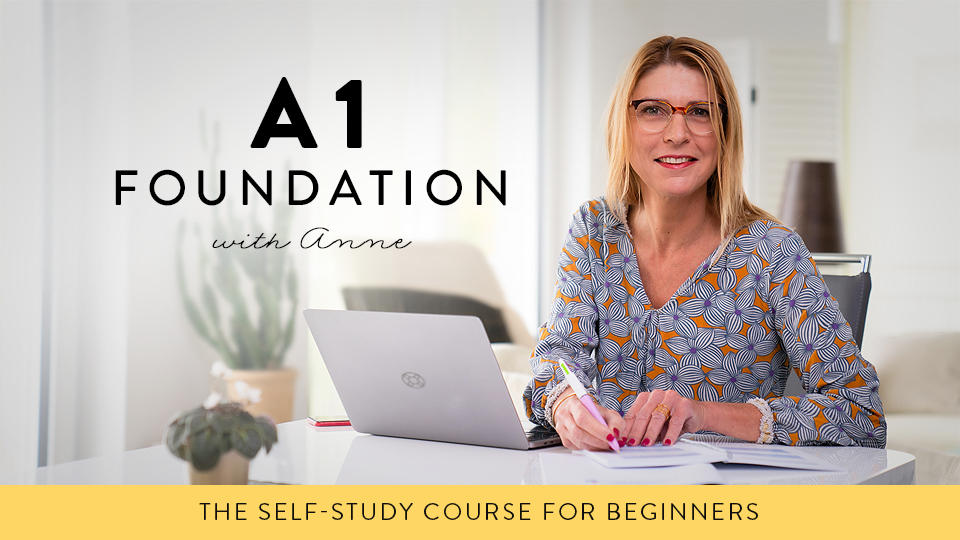We find comfort in having a habit, right?
Think about what you do every morning after you wake up: do you follow the same routine every day? Why?
Because we like having the routine. We like the predictability of what’s going to happen.
And not only do we enjoy the comfort of routines, but having effective daily habits allows us to make progress and ultimately meet our goals.
But as you and I both know, starting a new habit is really tough. Even if we have a goal we really want to achieve, like becoming fluent in Luxembourgish or taking successfully a language exam.
Not only that, but it can also be difficult to know if you’re making progress. How do you track your progress?
In this lesson we are going to answer those questions so that you:
- can easily create an effective habit that helps you meet your Luxembourgish goals; and
- know, without a doubt, when you’re making progress.
Discover 3 simple steps you can take to build an effective daily habit
STEP 1
The first step toward building an effective habit to help you meet your Luxembourgish goals is to connect the new habit you want to create with an existing habit.
That sounds more complicated than it really is. Think about how you stack plates or cups in a cupboard. Why do you stack them that way?
We do it because, of course, plates stack on top of each other or they fit together perfectly. The same thing is true with cups and bowls.
So how does this apply to habits?
Well, to answer that first, let’s talk about the habit that you want to create to help you meet a goal. For example, maybe your goal is to read a book in Luxembourgish. The habit you would create is to read something every day.
Or perhaps your goal is to increase your Luxembourgish vocabulary. So the habit becomes taking time every day to practice specific vocabulary.
In both cases, you’re attempting to add something new to your daily routine, which might be time to read or time to practice vocabulary.
Usually, when we want to start something new like that, we simply say, I’m going to start studying for 30 minutes every day, or I’m going to read for 15 minutes every day, but we don’t really identify a specific time when we’re going to do that. As a result, we don’t commit to it.
A more effective way to build in a new habit is to think about your current routines, maybe your morning or evening routine when you already have time alone without distractions. And you can commit to some focused time.
If you can identify a current habit that you have and connect it to this time that you want to practice vocabulary or spend time reading, you are stacking your habits. You’re finding an opportunity where your new habit fits perfectly with your existing habits.
Let me give you an example.
I’m certain that in the mornings or the afternoons part of your routine includes a coffee / tea break. So you spend a few minutes every day, drinking a cup of coffee/tea. It doesn’t really take a lot of focus to do that.
So perhaps you could add another habit while you’re having your break. For example, you could read one page in a book or write down one new vocabulary words, and you build in a new habit of practicing those words.
When you do that, you’re stacking your habits. You’re incorporating a new habit into an existing one. As a result, it’s much easier to start that new habit and do it consistently.
STEP 2
The second step to building an effective daily habit is to start small, really, really small.
When we aim to implement small, bite-sized habits, they’re more likely to stick.
To make a habit stick or alternatively to stick to a new habit means to do it daily and consistently so that it eventually becomes automatic. Just like brushing your teeth every day is automatic. You don’t think about it. You don’t stress about it. You just do it because it’s what you do.
And the goal of creating a new habit is that it follows the same pattern. It just becomes something you do every day.
So let’s go back to those ideas of building a habit, to meet a Luxembourgish goal. For example, reading every day so that you can read a book in Luxembourgish, a small habit would be to read one page every day or read for five minutes every day.
Similarly, if your goal is to increase your Luxembourgish vocabulary, a small bite-sized effective habit is to practice just one or 2 words a day. Again, maybe while having a coffee break or commuting to work.
Daily practice guarantees that you get the repetition you need to be successful and make progress, eventually reaching your goal.
And that brings me to step number 3
STEP 3
You have to track your progress and you need to celebrate your successes.
When we’re starting a new habit, particularly related to language. We don’t always see what we’re doing.
You know you’re practicing Luxembourgish regularly. You know that you’re going to classes, but you still feel stuck, frustrated, nervous, or shy. Why do all that work if you don’t know that you’re making progress?
I recently told some of my students about a huge mistake I made when learning English. When I first started, I was extremely diligent in writing everything down: grammar structures, a lot of new words I wanted to remember.
And the benefit of doing that was after some time passed, maybe 1 month or even a few months, I could go back, look at my notes and say, Oh my gosh, I’ve done so much.
I remember when conjugating verbs was difficult for me, but it isn’t difficult anymore. My progress was clear.
The mistake I made was at some point I stopped doing that. I no longer had a written record. I no longer had demonstrated proof of my progress. And as a result, I lost motivation. I got frustrated and I wanted to give up.
So the key to knowing if you’re making progress is to keep track of what you’re doing.
And to make it easy, I’ve got a free download to help you do that.
I’m so excited to help you build your Luxembourgish vocabulary through an effective daily habit with this Weekly Planner & Progress Tracker:
You’re going to find two things:
Number one, you’ll find a progress tracker where you can write down what is the new habit that you want to start? What month is it? And you can track it every day that month, all you have to do is write GEMAACH (DONE) or a checkmark every time you do it.
Again, by doing that, you’re giving yourself a visual reminder of what you should do every day and you’re tracking your progress.
I’m certain that one of your goals in Luxembourgish is to build your vocabulary. So, number two, I want to help, you know, how to do that effectively with the weekly planner.
There’s a place for you to write down the new words or idioms that you want to remember and practice for one week, then every day, there’s space for you to write down some example sentences or different ways that you might use that new language.
Following this pattern gives you that repetition to create automaticity, the ability to use that new word automatically. There’s a new page for every week, during the month.
When you complete those documents successfully, you’ve developed concrete proof of how you’ve increased your vocabulary that month. And then you can do it again the next month and the month after and the month after.
So if you want to get started today on increasing your Luxembourgish vocabulary and build an effective daily habit to help you do that,
Then tell me about it! Share your progress so I can celebrate with you.
A1 Foundation
Challenge Yourself To complete Level A1 in just 8 weeks!
Self-Study Online Course For Absolute Beginners





